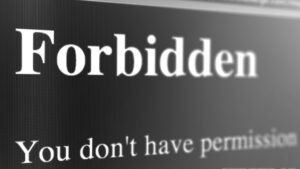The UK and EU appear to be pursuing censorship as a policy, tearing up the social contract as they dig deeper into an already bottomless pit.
The UK’s ‘Online Safety Bill’ passed its final stages on Wednesday, opening the door for the censorship charter to pass into British law. Across the channel, the European Union is pursuing its own version of censorship via the ‘Digital Services Act and Digital Markets Act’, which have already been adopted.
UK passes Online Safety Bill
Both the UK and EU will pressure internet websites and content providers from big social media companies like Facebook, Instagram, X etc. to small blogs like this one, to either self-censor and avoid posting certain content on their platforms, or face consequences such as being blocked by ISPs, fines or even being imprisoned.
In so many words, the Online Safety Bill means it will be illegal to challenge the official government narrative online.
The Online Safety Bill passed in Lords while amended positively still encourages censorship by Big Tech & impacting encryption & privacy. See YouTube & @rustyrockets as example @beverleyturner @toryboypierce
Too many attacks on Free Speech. No free society without it pic.twitter.com/7WfKkU8WjT
— Alan D Miller (@alanvibe) September 20, 2023
Needless to say, this goes beyond merely chilling free speech, as it is active antagonism against perfectly acceptable speech and public dialogue. Those with the conviction to speak out about government overreach, or any socially pertinent issue, may be criminalised and potentially imprisoned; something you’d expect to see in North Korea, not the United Kingdom or Europe.
Online speech has already suffered greatly since the start of the Covid-19 shenanigans era.
As reported by the Telegraph, an unsettling wave of censorship has led to those injured by poorly tested vaccines having to resort to coded online communication to share their experiences. Without a doubt, this appalling curbing of speech online means that social media users are facing an Orwellian wave of shutdowns as well as corporate-government gaslighting.
EU Commissioner praises speech suppression
Europe isn’t faring any better on this front. As covered by EU MEP and freedom fighter Patrick Breyer, Urusula Von der Leyen has managed to do a good deal of harm during her tenure. According to the MEP, she “uncritically cheers digitization, wants to burn our data in the profit interest of industry, and simply did not understand the digital age.”
These comments followed her recent appearance in a mid-week “State of the European Union” address, where commissioner Von der Leyen immediately praised what is known among opponents as the European Union’s censorship bills. According to the MEP, such frequent regurgitations from Von der Leyen regularly translate into “unethical legislative proposals (…) trampling on the fundamental rights of EU citizens.”
Such fairly serious criticisms levied at the Commissioner highlight how the European Union has incrementally passed laws that are an unambiguous insult to the European Charter of Fundamental human rights.
Due to the litany of disturbing events, Breyer is now convinced that the EU is moving to consolidate these unethical practices via new legislation that’s supposed to deal with artificial intelligence.
The fact that she now wants to let representatives of these corporations help shape Europe’s (EU’s) future in the area of Artificial Intelligence fits in well with the picture. With her proposal for an AI Act, she wants to open the door to biometric mass surveillance in public.
He adds:
On the one hand, Ms. von der Leyen keeps official text messages with the head of Pfizer about billion-dollar deals secret bypassing all rules, but on the other hand she wants to have our private messages indiscriminately scanned by unreliable suspicion machines via #ChatControl and destroy the digital secrecy of correspondence.
Censorship as policy
The chilling trends in many supposedly free, Western countries speak to an iron-curtain of censorship descending on the European continent. For the most part, such infractions against uncontroversial human rights – the very fabric of social cohesion – go largely unreported in typical news outlets.
Cutting information flows at the knees is what precipitated bad decision-making during the covid-19 hysteria. By turning censorship into a policy standard, both the United Kingdom and the European Union are effectively tearing up the social contract, amplifying already strained tensions between normal people and decision makers.


